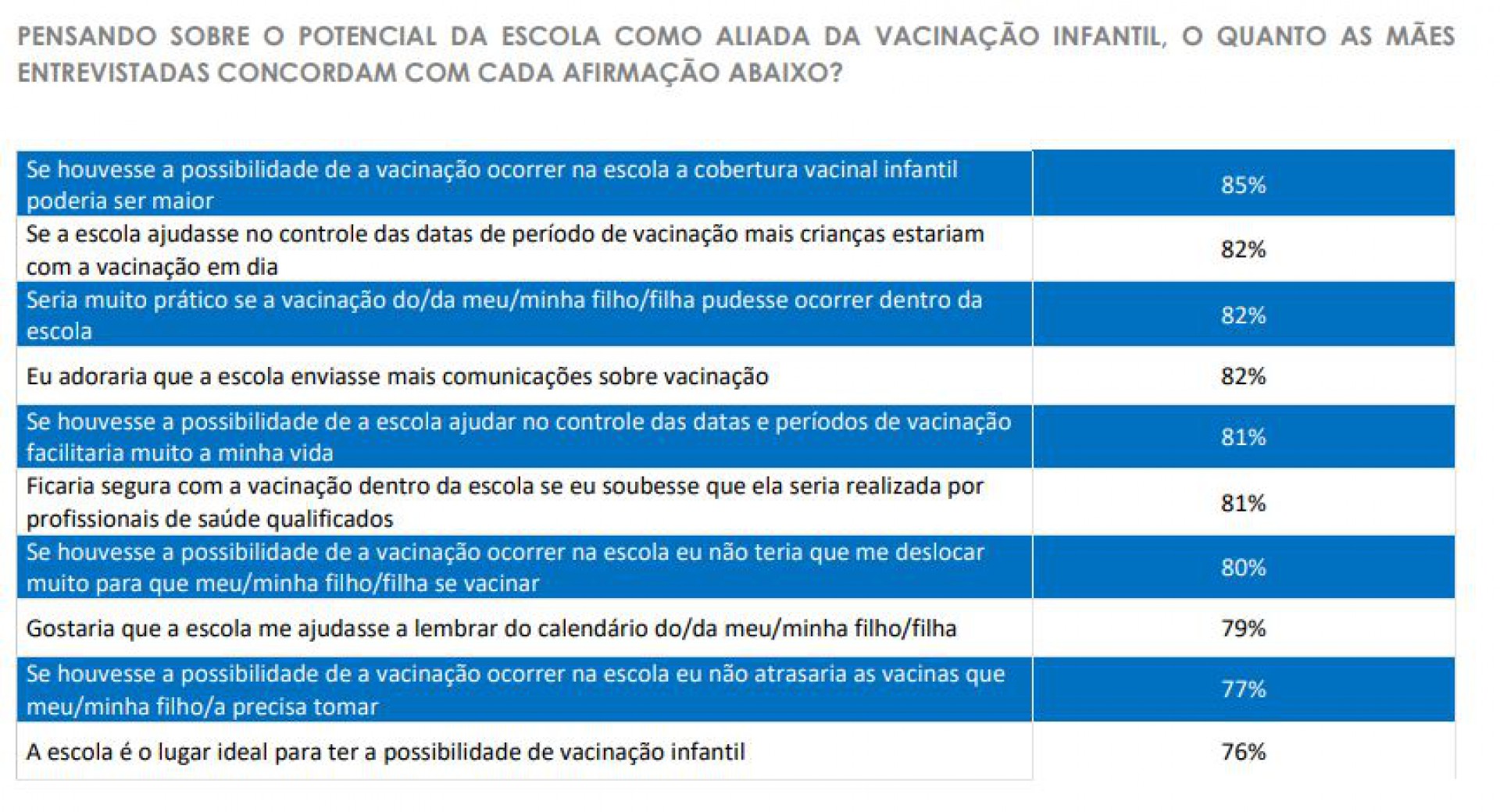The lack of access to correct information about the childhood vaccination schedule is pointed out by mothers as the factor that most interferes with the immunization of children at the right age. This is the finding of a survey carried out by the Locomotiva Institute, commissioned by the pharmaceutical company Pfizer, in which misinformation was cited by 45% of the women interviewed as the main reason for delaying or not immunizing children.
Difficulties with displacement, lack of documentation and lack of time are also among the obstacles mentioned. The survey heard 2 thousand mothers of children and adolescents up to 15 years oldby telephone, between January 10th and February 8th of this year, in all regions of Brazil.
Exclusively maternal sampling, according to the president of Locomotiva, Renato Meirelles, was a strategic choice. “It is the mothers who manage the health of their children, and often even their husbands, remembering the date of vaccination, scheduling exams, consultations”.
Subscribe to O POVO+
Get access to all exclusive content, columnists, unlimited access and discounts in stores, pharmacies and much more.
After the misinformation, the hours of operation of the health centers, the long distance to the vaccination centers and the lack of information about vaccines appear tied in the list of obstacles analyzed by the mothers for the vaccination of their children, each with 39%, followed by the lack of specific vaccines in the Unified Health System (SUS) (26%) and the difficulty of finding time to take children to be vaccinated (18%).
As a result of misinformation, 17% of women said they lack confidence in vaccines. “This scenario is fueled by the fake news and reinforces the importance of the professional press to increase the dissemination of information that show the importance of vaccines for public health, especially in the infant phase”, commented Meirelles, noting that only 24% of the interviewed mothers consider themselves to have a high degree of knowledge on the subject of vaccines.On the other hand, 68% of them said they already felt confused about their children’s immunization.
For the president of the Department of Immunizations of the Brazilian Society of Pediatrics (SBP), Renato Kfouri, the survey data help to explain the sharp drop in childhood vaccination rates in Brazil.
“We started to observe a scenario of decrease in vaccination coverage from 2017. If before it (coverage) fluctuated around 90%, today it is in the range of 60% to 70%”, analyzes the doctor, who is also a member of the Technical Advisory Committee of the National Immunization Program (PNI).
The Ministry of Health’s childhood vaccination schedule includes 18 types of immunizers for children and adolescents up to 15 years old. The goal of vaccinating 95% of the target audience has not been achieved since 2019 in any of the vaccines. The last coverage above the percentage recommended by the health authorities occurred in 2018 with the BCG (99.72%) and pneumococcal (95.25%) vaccines. Information is available on DataSUS.
The solution to the problem, in the opinion of the mothers interviewed in the survey, may be found in schools. Almost 9 out of 10 of the interviewees (88%) said they believed that the teaching units could facilitate access to childhood vaccination, either by alerting parents about the immunization calendar dates or even making the doses available in the school environment itself.
Among the benefits, 80% of women mention the reduction in displacements. This decrease, for 76% of them, would help to save expenses associated with the journey, linked to costs such as bus tickets, app transportation or gasoline.
“It would be very practical, because this trip (home to school) is done daily. This shows that the problems pointed out by the mothers in the survey have the opportunity to be solved with a public policy”, underlined the president of Locomotiva, stressing that the measure would have the potential to reach almost 9 million students in early childhood education and 47 million in basic education. .
Taking vaccination to schools, in Renato Kfouri’s view, is essential to make up for delays in the immunization of adolescents, but it would have little impact on routine coverage of children under 2 years of age.
“It is a strategy that does not increase coverage in the first year of life, when children are immunized against polio and measles, for example. We must not forget that around 60% of children are not in schools or day care centers before the age of 4”, observes the doctor.
The medical director of Pfizer, Adriana Ribeiro, points out that the survey results indicate a picture of multifactoriality behind the low indicators of vaccination coverage in childhood. “We are talking about a problem influenced by several elements, be they social, economic, behavioral or information”. She says she believes that the integration between health and school can pave the way for intersectoral strategies that lead to the reversal of the scenario of drop in childhood immunization rates in Brazil.
Reasons that hinder childhood vaccination, in the opinion of mothers*
- Lack of information/knowledge about the vaccination schedule – 45%
- Hours of operation of health agencies – 39%
- Difficulty accessing UBSs/health centers/clinics – 39%
- Lack of information about vaccine – 39%
- Lack of specific vaccines in the SUS – 26%
- Time difficulty to take a child to vaccinate – 18%
- Lack of confidence in vaccines – 17%
- Lack of any document that prevents vaccination – 10%
- Lack of professionals to apply vaccines – 9%
- Low perception of disease risk – 9%
- Others – 0.2%
*Questionnaire with multiple answers
Source: Instituto Locomotiva (commissioned by Pfizer); 2,000 mothers interviewed, between January 10th and February 8th of this year, across all regions of Brazil
Thinking about the potential of the school as an ally of childhood vaccination, how much do the interviewed mothers agree with the statements below:
- If there were the possibility of vaccination taking place at school, child coverage could be higher – 85%
- If the school helped in controlling the dates of the childhood vaccination period, more children would have the vaccine and day – 82%
- It would be very practical if my child’s vaccination could take place at school – 82%
- I would love for the school to send out more communications about vaccination – 82%
- If the school helped in controlling the dates of childhood vaccination period, it would make my life much easier – 81%
- I would be safe with vaccination at school if I knew it would be carried out by qualified health professionals – 81%
- If there was the possibility of vaccinating at school, I wouldn’t have to travel far for my child to be vaccinated – 80%
- I would like the school to help me remember my child’s calendar – 79%
- If there was the possibility of vaccination being done at school, I would not delay the vaccines that my child needs to take – 77%
- The school is the ideal place to have the possibility of childhood vaccination – 76%
Source: Instituto Locomotiva (commissioned by Pfizer); 2,000 mothers interviewed, between January 10th and February 8th of this year, across all regions of Brazil
(The reporter traveled to São Paulo at the invitation of Pfizer)
Doubts, Reviews and Suggestions? Talk to us
Tags


